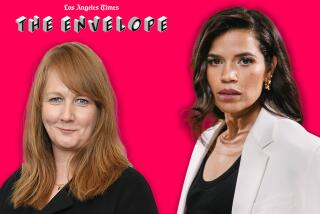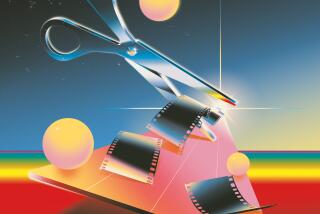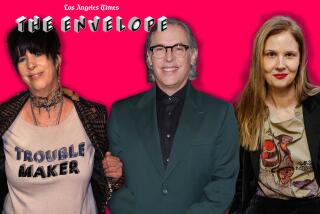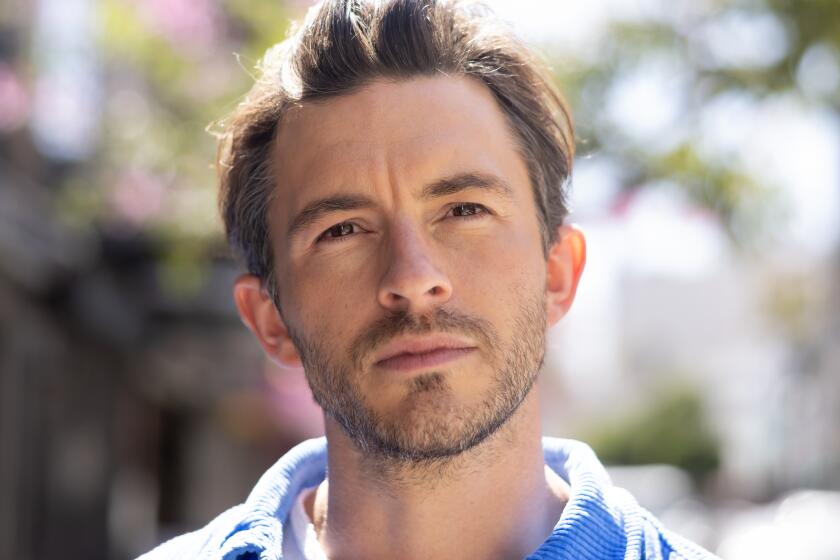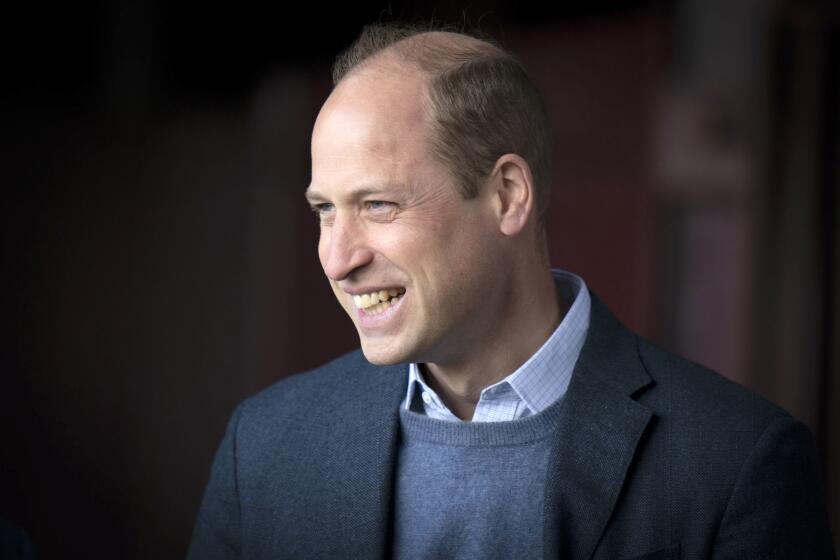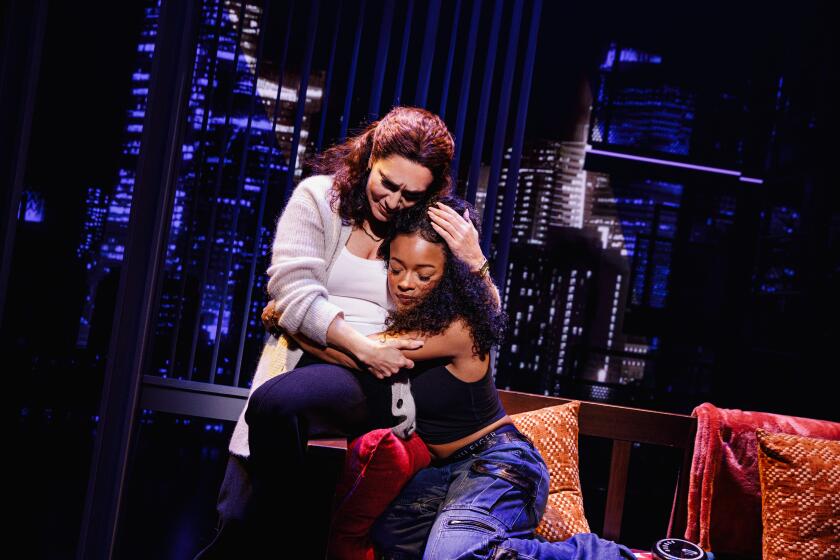The Envelope: This year’s lead actors took on roles that test the man
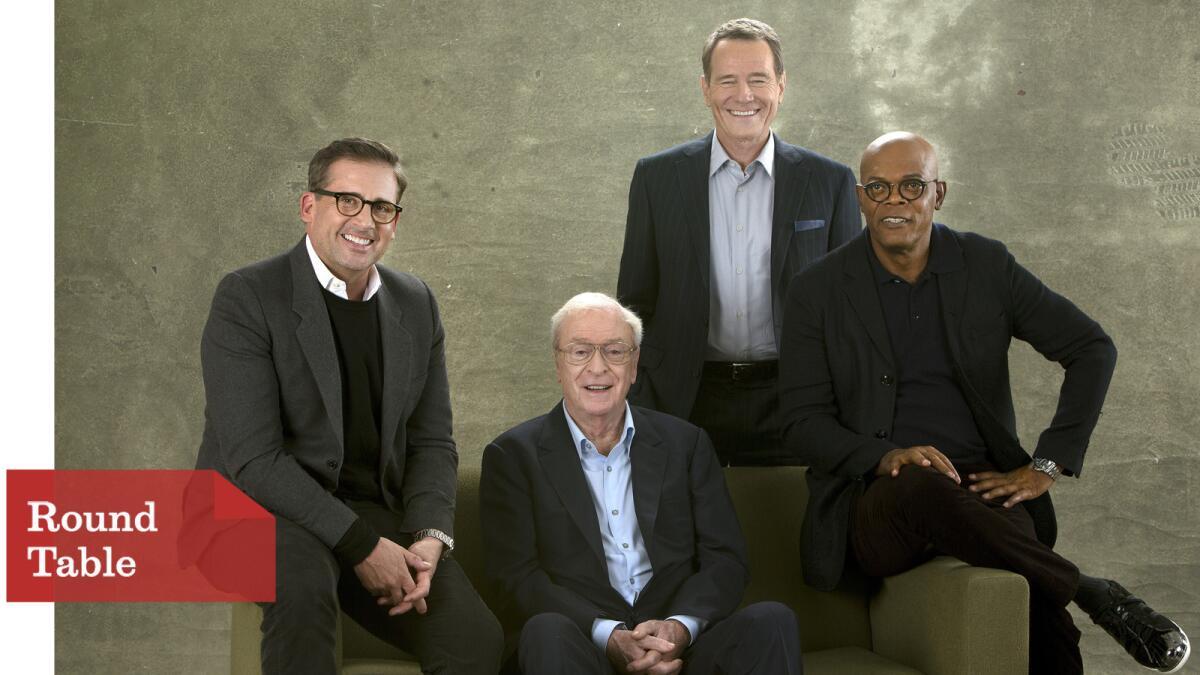
The Envelope gathers some of the leading Oscar contenders for Lead Actor, to chat about their roles and the industry: we speak with Steve Carrell, Bryan Cranston, Machael Caine and Samuel L. Jackson.
An impressive group of actors who gave some of the year’s most inspired lead performances recently gathered for The Envelope’s Lead Actor Roundtable conversation that drew from their distinctive backgrounds in not only cinema but theater, television and commercials as well. That they asked one another questions as much as answered them showed they are all still students of their craft, still eager to learn and improve.
The group included Michael Caine, who stars as an acclaimed classical conductor grappling with retirement in “Youth,” Steve Carell, who plays a pushy but moral Wall Streeter in “The Big Short,” Bryan Cranston, who plays blacklisted writer Dalton Trumbo in “Trumbo,” and Samuel L. Jackson, who appears as a crafty bounty hunter in “The Hateful Eight.”
SIGN UP for the free Indie Focus movies newsletter >>
Here are edited excerpts from the conversation moderated by Times film writers Rebecca Keegan and Mark Olsen in which the actors talk about establishing a quick rapport with their co-stars, the importance of who shoots first and whether you have to like your character to understand him.
Mark Olsen: Michael, in the movie “Youth,” you play opposite Harvey Keitel, and you’re supposed to have been longtime friends. When you come on a film and you’re supposed to have a prior history with another actor, how do you quickly establish a rapport?
Michael Caine: Well, with us two it happened accidentally. We didn’t know we were gonna have a rapport immediately, but he is an ex-Marine, and I’m an ex-infantry soldier, and I fought in Korea, and when you’re infantry soldiers, you have a special bond rather than all other types of soldier. And so, we had this thing — we became friends the moment I said I was a soldier, and he said he was a Marine, and everything else came naturally, because obviously the script was written about two guys who know each other very well. So you’re talking as though you know each other very well, and we’d already got over the emotion. So we were very lucky.
Olsen: Steve, on your film, “The Big Short” you’re working with director Adam McKay, whom you worked with on the “Anchorman” pictures. This is a different kind of movie, but what did having that kind of relationship with him do for you?
Steve Carell: Oh, I’ve known him since the late ‘80s. We go way, way back, and I’ve always known him to be very funny and very smart, but I think there’s a lot of passion to him that I don’t think people necessarily knew about, and a depth to him and an anger. It’s specifically about this topic. So he was able to channel all of those things, along with his inherent humor, into directing it.
Olsen: Sam, every time Quentin Tarantino comes to you with a new script, he’s taking on a whole new world, a whole new genre. When you get a script from Quentin, what’s your first thought?
Samuel L. Jackson: I can’t wait to go do this, even before I read it. It’s kinda like, “OK, I know it’s gonna be great, I know it’s gonna be fun,” and then, you know, if he hasn’t given me a preview and all he’s given me is a name, then I delve into the script and wait till that name shows up, and kinda take that trip with it and enjoy all the other things around it, and wish I was this other character, because he’s saying some things I wish I could say, and it’s just kind of wonderful.
When he called me with “Hateful Eight,” he told me that he wasn’t going to make the movie because the script had already been leaked online, or leaked by someone, and he was really heated about it. So, he said, “I’m gonna send it to you and let you read it, but I’m not gonna make it, but I’ll write you something else.” And I’m like, “What?” So when I did get it and I read it, I was like, “Oh, come on, really?” He wrote this great part for me, and he’s not gonna make this movie? After telling me, you know, after sending me “Django” and saying, “Ah, you’re not Django.” And I’m like, “What? Really? So I’m 15 years too late to be Django, but, you know, you want me to be the most despicable negro in cinematic history, but OK, fine.” So I always know it’s going to be something interesting, it’s going to be fun, and his sets, and working with him, is an experience I think all actors should have.
Keegan: Bryan, one thing I think some of these movies share, is that they have a really specific tone, and I’m curious how you guys approach the tone on “Trumbo.” Like “The Big Short,” it’s serious subject matter, but there are a lot of comic moments. How did you talk about that?
Cranston: Well, it was inherently in the script, and keeping in mind that these guys, who were blacklisted in the late ‘40s and all through into the ‘60s were Hollywood screenwriters, most of them, very witty, clever, writers, who can turn a phrase, can craft a joke, so I think it was germane to the story to have that come out, that in many cases, you know, when you’re faced with traumatic experiences, you turn to humor to try to just lighten some of the burden that you’re carrying with you. So it seemed appropriate.
Olsen: Michael, over the course of your career, the industry has changed so much and acting styles have changed a lot. Do you approach a role now differently than you would have earlier in your career?

The Envelope gathers some of the leading Oscar contenders for lead actor to chat about their roles and the industry: Steve Carell, Bryan Cranston, Michael Caine and Samuel L. Jackson.
Caine: No, I do it all the same every time. I’m too dumb to change. I’m my own worst critic, and all I ever do is try and be better than I was last time. At this age now, I’ve sort of retired, and I only do scripts that test me, people who are as far away from me, socially, as possible. I mean, I come from a slum, working-class place in London, and in “Youth,” this movie I’ve just done, I play a classical composer and conductor, which is about as far away from the true me as you can get. And that was the challenge for me.
Keegan: Steve, for your character in “The Big Short,” this is a guy who works on Wall Street, he’s steeped in that world, there’s a lot of financial terms that are new to a lot of us. How much did you immerse yourself in it and learn about it?
Carell: Well, I didn’t know much about it at all to begin with. And learning the dialogue was hard because it was like learning a foreign language. It was a lot of words, phrases, concepts, that I didn’t know. And one of the things Adam McKay likes to do is have people improvise. He does that in his comedies, and it remained the same for this, so we had to not only learn the dialogue and learn the concepts within the dialogue, but we had to gain at least a cursory knowledge of the broader picture so we could improvise within those characters. And that was a little daunting because he’d throw out suggestions, you know, “Grill him on his CDOs,” and you freeze for a second, and then you go through the Rolodex of “OK, what did I learn? How did I prep for this?”
But it was interesting meeting the real guy that I portrayed because, I don’t know if you guys feel this, when you portray a real-life character, that you don’t want to feel like you’re conducting a science experiment when you meet them — you’re watching them, how they drink a cup of coffee, and it feels creepy in a way, to prepare and watch someone and try to absorb them. So I tried not to do that so much as get an essence for who this guy was and how he sort of navigates this world.
Jackson: He didn’t ask you to make him cooler, or, you know, could you make me taller in this movie?
Carell: He actually showed up. He was there the first day of shooting. He was at the monitor, and he’s a very confident person, very intelligent, but he was telling the director how to frame shots. He’d never been on a set before —
Cranston: Wow.
Carell: — but he’s the guy who feels supremely confident and never backs down from a challenge, and just having him there and having that attitude was helpful.
Jackson: So you were typecast.
Carell: Exactly. But it just reaffirmed every choice that I thought I should make in the first place to see him that comfortable in his own skin.
Keegan: Bryan, when you’re on stage you have that audience feedback, so when you’re shooting on a set, do you like to look at the monitor, do you like to look at dailies, how do you know how it’s going?
Cranston: You feel it. I don’t particularly like to look at playback or monitors and dailies and all that. That’s not my business. I think we all get a sense of it, and I don’t hesitate if I want another take because something didn’t quite go where I thought it could, and maybe where it went was the good way, but I think it’s experimental. You want to try to go out on a limb to see how far you should be going. I like to work with actors who are are fun to be with — it’s funny to hear me say that, because after a number of years I appreciate that we bring energy to the set, we have fun, we get the work done, we go home. That we put the drama in the scene and not around the scene and just have a good time. But every actor works differently. There’s no two that are really alike.
Jackson: So do you like to be on camera first or off camera first?
Cranston: It depends on the scene, the complexity of the scene. If my character has a bunch of dialogue, usually I like to go early on as opposed to later, because you just get physically tired if you’re going around and shooting all day for one scene.
Olsen: Do you have a preference for that, Sam?
Jackson: No, I don’t have a preference for being first or second, but sometimes it’s interesting to do the other side first, just because that other actor, you’ve watched them work enough and you know that other actor wants to do like 18 different things. On first take he wants to do one thing, on the next take he wants to do something else, on the next take he wants to do something else, and you’re on the other side doing your dialogue and kinda watching, so that by the time it’s time for you to do your side, you have to ask them, “So, out of all those things you did, which one of those things should I react to?” And I’ve worked with actors who do the strangest thing, that when you rehearse the thing before they actually shoot it, that actor will ask to go first, and he’ll do everything you did in rehearsal. He’ll take all the things you did, he’ll drink out of a cup, he’ll eat something, he’ll do all those things, and you’re like … really? You’re really gonna steal everything?
Cranston: How do you guys deal with a director who wants to do three dozen, four dozen takes?
Caine: I get up to about five and I give the director a look, and he goes, “I don’t think I’ll do six.” My entire day is based on getting home early. And so you become a very efficient worker. You know? I don’t want three takes, because that’s gonna make it later getting home.
Carell: It’s great when you know your director has 7 p.m. dinner reservations.
Jackson: Yeah, or if he’s a Laker fan or a Dodgers fan and wants to get to the game. That’s awesome!
Olsen: Steve, your character, in your new film is pushy and overbearing, he should not be a likable character. And yet somehow he turns into someone who’s very sympathetic and almost the moral center and hero of the film. Was that difficult for you to capture?
Carell: I never thought about that necessarily. I think he thinks of himself as a hero. Whether he is or not, it’s ambiguous because this is a man who certainly was able to gain a lot in the course of what happened financially. There certainly was no judgment towards him. And he’s a real guy, so I thought about meeting him and meeting his family, and I quite liked him. He is all of those things in real life, but I liked him, I respected him, I thought he was a nice guy, he’s kind of [a jerk], but a good guy.
Caine: A nice [jerk].
Olsen: Bryan, you, of course, recently created one of the definitive antiheros of modern television on “Breaking Bad,” and do you have a feeling regarding how much you have to like or sympathize with a character?
Cranston: No, I think any time you start asking yourself, “Do I like myself?” that’s an objective viewpoint. So I didn’t even read the scripts too far in advance when I was doing the show, because he was on such a rollercoaster ride, twisting and turning, it didn’t help me. So about four days before, I’d read a script and we’d move on. I found it better, for me as an actor, just to make quick decisions and try to figure it out as we were going along. I think it’s deadly to stand in judgment of your own character.
Jackson: There are times when you’re sitting and watching the film or you’re working with an actor and you realize the actor doesn’t want the audience not to like him. And you’re kinda like, “Dude, it doesn’t matter, you know? Be honest to that character.” I play despicable people all the time, but they all have a sense of humor. It’s like I tell people, killers don’t sit around sharpening their knives and polishing bullets all day long. They take their kids to school, they buy groceries, they do what they do, you know? Some bad guys know they’re bad guys, and they’re intentionally bad, and they’re unapologetically bad. But you don’t make a judgment, you don’t ask people to like you. You are who you are.
More to Read
From the Oscars to the Emmys.
Get the Envelope newsletter for exclusive awards season coverage, behind-the-scenes stories from the Envelope podcast and columnist Glenn Whipp’s must-read analysis.
You may occasionally receive promotional content from the Los Angeles Times.
